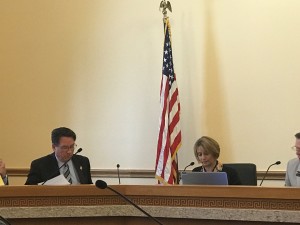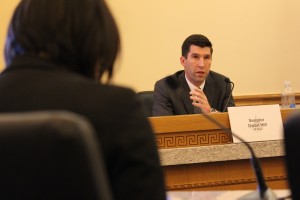DENVER — With just 14 days to go to the end of the 2017 Colorado legislative session, hundreds of bills remain in the que, but some are being ignored in the House, leaving senate lawmakers scratching their heads and wondering if the budget will be balanced this year without a special session.
Bills are piling up in the Democrat-controlled house while some senate committees are left with nothing to do — such as the Senate Judiciary Committee that heard one bill over three days.
“Obviously, it’s politics 101,” said Assistant Majority Leader Sen. Ray Scott, (R-Grand Junction). “They are trying to run out the clock on certain items. My feeling is we should just adjourn the senate for three or four days — whatever we can do statutorily — and go home. Whatever is on the calendar dies.”
Some of those bills, however, are important to balancing the budget and making sure schools are funded next year. In fact, the backlog has already caused legislators to miss the deadline for balancing the budget.
SB17-256, concerning hospital reimbursement rates, and SB17-262, concerning the transfer of money from the general fund to cash funds were passed in the senate on March 30 and almost immediately heard in house committees. But since, were laid over three times before being passed on second reading Thursday.
They were scheduled for third reading today, but laid over again until Monday.
“The budget is still hanging in limbo because of (those two bills),” said Senate President Kevin Grantham, (R-El Paso) at a media briefing Thursday, when the bills were scheduled for Friday. “They could have passed those a week ago and we’d be done with the budget. … We have one task. One task over 120 days that the people of Colorado have put the screws to us to accomplish, which is balancing the freaking budget. So, let’s do it.”
Those bills, one of which would cut $264 million in reimbursement to hospitals and one that would transfer money around for transportation needs, respectively, also play key roles in HB17-1242 and SB-267, but both of those appear to be dead.
If HB17-267 dies, it could do serious harm to rural hospitals, as SB17-256 cut funding in anticipation of HB17-267 passing to replace that money. But negotiations stalled over a key provision in the bill.
Thursday morning, Senate Republicans, including Grantham, Randy Baumgartner, who represents parts of northwestern Colorado and Jerry Sonneberg, who represents part of northeastern Colorado, said they are close to pulling the plugs on the two bills, or don’t expect them to get past the rest of the senate.
“If we’re not going to have any negotiations in good faith, then what they have done has not been in good faith,” a visibly frustrated Sonneberg told reporters about SB-267. “If we’re not going to have negotiations, then there is no point in having a damn bill.”
The bill seeks to pump about $400 million into rural school districts, $300 million into rural communities for road projects and inject millions more — possibly even hundreds of millions — into rural hospitals by way of Medicaid and the Hospital Provider Fee.

Sonneberg went from the briefing to an appropriation hearing, where he stopped short of postponing it indefinitely, instead asking for it to be held over until the next meeting. He hopes to be able to salvage some resemblance of it that the rest of his party can get behind.
“I’m not ready to give up,” Sonneberg said in appropriations. He later Tweeted: “Surely there is somebody in the (House) that wants to solve this hospital issue. Give me a number… any number to work from.”
Sonneberg and two other Senate Republicans, Jake Tate, (Arapahoe), and Owen Hill, (El-Paso), stuck their necks out trying to find a compromise on the issue that has long caused angst among lawmakers.
One main characteristic of Senate Bill 267 divides the parties — reclassifying the Hospital Provider Fee from a Taxpayer Bill of Rights (TABOR) governed cash fund to an enterprise fund that would not be limited by TABOR.
Sonnenberg got support from enough Republicans to pass the bill by exchanging the reclassification for a lower TABOR cap. By converting the fund without the compromise, it would free up space under the cap and give lawmakers more money to spend.
Hill said last week that lowering the TABOR cap was mandatory for his vote.
Thursday, Hill explained his support, saying there is right way and a wrong way to do an enterprise fund.
“The Democrats in the past have tried to enterprise this fund to give them more money to spend,” Hill said. “But I’m proud of Jerry Sonnenberg for standing up and saying, ‘No, we’re going to protect this from being used wrong. We’re not going to use hospital provider fees to pay for the rest of our budget. That’s fiscally wrong, so we’re going to move it out and protect it from state meddling. But at the same time, we’re going to reduce the overall amount the state is going to spend.’”
Hill said Democrats hate that idea.
“They hate that we would use that to reduce overall state spending,” Hill said. “Instead, they want to have that as a hostage, where they can hold the hospital provider fee as a hostage as an excuse to try to twist the taxpayer’s arms to try to get permission to spend more money.”

Hill said he was comfortable with the vote because the cap is not a two-way street. Legislators can lower the base, but it can only go up by a vote of the people.
“And I think everyone can agree, we shouldn’t be using that to balance the state budget for all our other programs,” Hill said. “That money should be for the hospitals and the state government shouldn’t be taking private enterprise money to balance our budget.”
Grantham said although the Republicans have compromised and negotiated, the Democrats won’t.
“Now we present a bill and give them the opportunity,” Grantham said. “The other side is not willing to work with us on the zero-base movement. So we’ll let our constituents decide whether or not our efforts were in vain or worthy. But I think we put everything on the table and are happy without efforts. Whose fault is it that we don’t have a deal on the hospital provider fee? We moved. The other side didn’t.”
Grantham also announced that he doesn’t believe HB17-1242, the transportation bill that would ask voters to raise sales taxes by .05 percent to a dedicated list of projects, will advance.
Grantham said he doesn’t have the three votes needed to get past the Finance Committee. The bill will be heard in Finance on Tuesday.
“If we don’t get anything done in the next 15 days we will be back,” Grantham said. “However, I can almost guarantee you there will be measures on the ballot this November.”
In fact, several options are making their way through the citizens initiative process now including one from Independence Institute President Jon Caldara* that would force lawmakers to bond either $2.5 billion or $3.5 billion for new roads and pay it back with existing money.
“My hope is that we get one solid measure on the ballot, whether it comes from the legislature or an outside group,” he said. “The bottom line is we need to fix transportation funding in this state.”
* Complete Colorado is a project of the Independence Institute.


